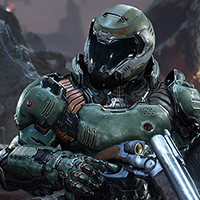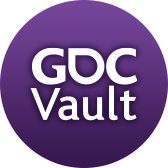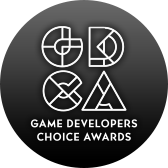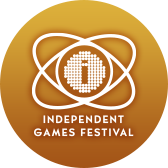When id Software resurrected the demon-slaying shooter DOOM in 2016, it did so by reinventing the standards of first-person shooter combat, encouraging players to constantly engage with their monstrous foes and never disengage until the last monster falls.
If you were enthralled by that combat system, then you might want to check out this upcoming session at the 2018 Game Developers Conference from id Softwares' Kurt Loudy and Jake Campbell, the senior systems designer and AI programmer who led the charge on DOOM's combat. To give you a sneak peak of their talk, we reached out to Campbell and Loudy to discuss their work on DOOM and their experiences in the game industry.
Don't miss out! The Game Developers Conference in San Francisco next March is going to be full of interesting and informative sessions like Loudy & Campbell's. For more visit the show’s official website.
Tell us about yourself and what you do in the games industry.
Jake: I create life in enemy characters, then players destroy my beautiful creations.
Kurt: My name is Kurt Loudy and I've shipped 11 video games on 11 different platforms in 11 years. I've worn a lot of different hats during my career and the one currently adorning my dome says "AI" and has a teeming horde of monsters under it.
What inspired you to pursue your career?
Jake: Playing games and realizing that I enjoyed them so much I wanted to be part of creating them.
Kurt: All of us have a short list of video games that were so impactful that they dreamt of making one someday. I'm lucky enough to work for a studio responsible for one of those titles, and hopefully a game I've contributed to does the same for a young gamer out there, too.
Without spoiling it too much, tell us what you’ll be talking about at GDC.
Jake & Kurt: Attendees will learn the design philosophy and implementation behind "push forward combat". This includes inspirations, previous iterations, and how we arrived at the final tenets. If something piques one’s interest to the point they include a facet of 'push forward combat' in a future title, then we'll consider it a job well done!
For those of us unfamiliar with the term, could you define what push forward combat is?
Jake & Kurt: "Push forward combat" is a filter we use to judge whether a mechanic is appropriate for the game. The core pillars are fast movement, unique weapons, strong AI archetypes and the player's brute strength. We run features through this litmus test, and so reload was not complimentary because it meant the player was briefly unable to attack and forced to disengage; but, double jump is a great addition because it increases mobility and allows the player to close the distance from a greater range.
The result of "push forward combat" is a gameplay loop where the player is constantly moving, sizing up combatants, and then improvising with their weapons and fists to put the enemy on their heels. Our mantra is "make me think, make me move" because we've given the player the tools and abilities to be Hell's worst nightmare, but they must exercise that agency by using the arena and their arsenal to make split second decisions to thwart the hordes of monsters that serve as combat puzzles.
Where did the decision to give more agency to the player in terms of gathering resources from enemies stem from?
Jake & Kurt: The Doom Marine is a relentless force and having them stop to regen health, or disengage to go resource hunting, didn't jibe with ‘push forward combat.’ AI that are walking health & ammo packs – with a bonus for Glory Kills – keeps the onus of engagement on the player, and resource replenishment becomes part of natural movement and not a detour.
What are some of the biggest challenges you face in your work?
Jake: Without a doubt, the biggest challenge is simply that all of us are incredibly invested in what we do and this can lead to frustration when we have to make compromises. However, we feel this is a good problem to have.
Kurt: The speed the games industry changes is incredible. Five years ago, battle royale, mixed reality and “loot boxes” weren't part of the common game design lexicon, yet are some of the hottest topics in gaming. Conversely, the trendiest genre then (4v1 MP) never reached critical mass, second screen failed to take hold, and season passes evolved from 'any DLC post-release' to sports-like calendar seasons as "games as a service" took hold. To quote a wise Jedi, "This is not going to go the way you think!"
What are the most rewarding parts of your job?
Jake: Being able to create an experience that is shared with millions of people and have them enjoy it. It’s a pretty good gig, I won’t lie.
Kurt: The unpredictability of the player makes video games my favorite entertainment medium, but also the most challenging to make. They'll routinely befuddle, frustrate and surprise you & your best laid plans, but there's few things more rewarding than a player enthralled by your creation (Twitch is yet another feature that wasn’t in the game design toolbox five years ago). Even when one is hit with the dreaded "this sucks!" the simple act of creating is immensely rewarding in and of itself.
Do you have any advice for those aspiring to join your field someday?
Jake: Working on a plaything is actually a serious endeavor. So take it seriously.
Kurt: A common misconception is that Designers are the genesis of all the features in a game, but really a game is flooded with ideas and the Designer is there to discern what's best for the game and shepherd that through development. Thus, a crucial attribute to game development is embracing someone else's idea and turning it into a fun feature.
GDC 2018 will take place March 19-23rd at the Moscone Center in San Francisco. For more information, visit the show's official website, or subscribe to regular updates via Facebook, Twitter, or RSS.



